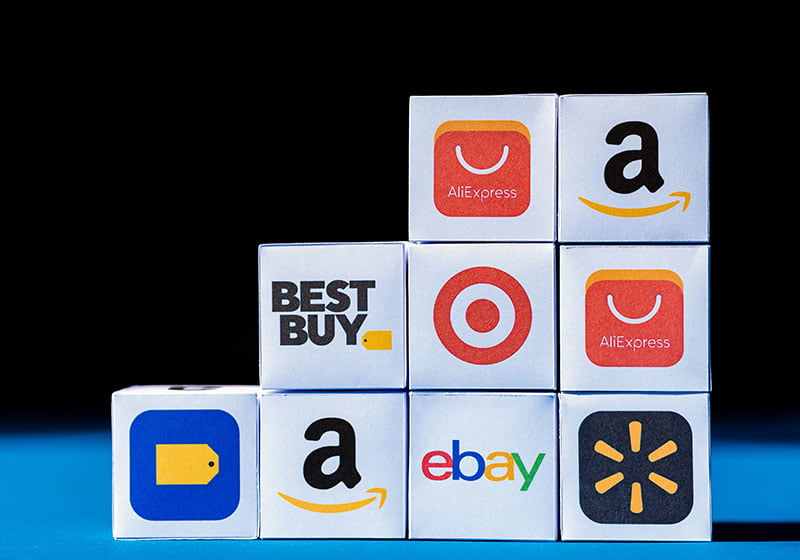Online Business and Retail Platforms
Online retail, also known as e-commerce, refers to the buying and selling of goods and services over the internet. This sector has dramatically transformed the traditional retail landscape by allowing consumers to shop from anywhere at any time, broadening the reach for businesses and providing more convenience for shoppers. Online businesses utilize websites and apps to showcase products, manage transactions, and communicate with customers. Key advantages include lower operational costs compared to physical stores, access to a global market, and the ability to collect detailed consumer data for better marketing strategies. However, it also faces challenges like intense competition, the need for robust cybersecurity measures, and dependence on effective logistics and delivery systems.
Online Success Stories
Certainly! Here are some successful online business ideas that have shown significant growth and profitability:
- Amazon
- AilExpress
- Ebay

- Online Retail Store: Selling products directly to consumers through an e-commerce platform. This can include anything from clothing and accessories to home goods and electronics.
- Dropshipping: An e-commerce model where you sell products on your website without holding inventory. When a customer makes a purchase, the order is fulfilled directly by the supplier.
- Subscription Services: Offering products or services on a subscription basis. This could be anything from monthly beauty boxes and meal kits to streaming services and software.
- Digital Marketing Agency: Providing online marketing services such as SEO, social media management, and paid advertising to other businesses.
- Online Education and E-Learning: Creating and selling online courses or coaching services in various subjects or skills, from academic subjects to hobby-related content.
- Freelance Services: Offering professional services such as writing, graphic design, web development, or consulting, all conducted online.
- Print on Demand: Selling custom designs on products like t-shirts, mugs, and posters, which are printed and shipped by a third party once a customer makes a purchase.
- Affiliate Marketing: Earning commissions by promoting other companies’ products on your website or social media channels.
- App Development: Designing and developing mobile apps for different purposes, either for clients or as your own products.
- Health and Fitness Coaching: Offering fitness programs, nutritional advice, or personal training sessions through virtual platforms.
Our Best Solutions
Advanced Technology
Expert Engineers
Delivery on Time
H.T.I team, can help anyone to become an online sensastional success.
These business models leverage the power of the internet to reach a wide audience and can be started with varying levels of investment, making them accessible to many entrepreneurs.
H.T.I will you every step of the way
Starting a successful online business involves several key steps, designed to build a strong foundation and effectively reach your target audience. Here’s a structured process to help you get started:
Identify Your Niche
Determine a market or industry you are passionate about or have expertise in. Research potential customer needs, existing competition, and market gaps.
A Good Soild Business Planning
Develop a detailed business plan that outlines your business idea, target market, unique selling proposition (USP), business model, and financial projections.
Legal Setup
Choose an appropriate business structure (like LLC, corporation, or sole proprietorship), register your business, and obtain any necessary licenses or permits. Consider the tax
Build Your Online Presence
- Website: Develop a professional website that is user-friendly and optimized for search engines (SEO).
Social Media
Establish profiles on key social media platforms where your target audience is active.
Select E-commerce Platform
If selling products, choose an e-commerce platform that suits your business needs (like Shopify, WooCommerce, or Amazon).
Set Up Payment Processing
Integrate reliable payment gateways to accept and process payments securely (like PayPal, Stripe, or Square).
Source Products or Prepare Services:
Depending on your business model, source products from manufacturers or wholesalers, or finalize the service offerings you will provide.
Logistics and Fulfillment
For physical goods, set up a logistics and fulfillment strategy. Decide whether to handle fulfillment in-house or use third-party fulfillment services.
Marketing and Customer Acquisition:
- Content Marketing: Create valuable content that attracts and engages your target audience.
- Email Marketing: Build an email list to communicate directly with customers.
- Paid Advertising: Utilize paid advertising channels like Google Ads or social media ads to drive traffic.
- SEO: Optimize your website and content to rank higher in search engine results.
Launch Your Business
Officially launch your business with a marketing campaign to create buzz and attract initial customers.
Analyze and Optimize
Use analytics tools to monitor your business performance. Regularly test and optimize your website, marketing strategies, and product offerings based on data-driven insights.
Customer Service and Retention
Provide excellent customer service to build trust and encourage repeat business. Implement loyalty programs or promotions to retain customers.
By following these steps, you can systematically approach the creation and growth of a successful online business, adapting as you learn from your experiences and market feedback.



 [/ultimate_carousel]
[/ultimate_carousel]